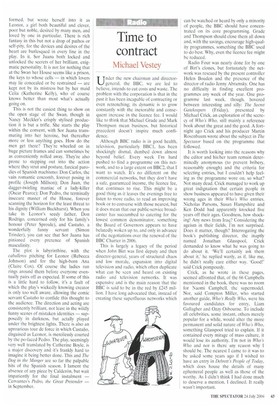Time to contract
Michael Vestey
Under the new chairman and directorgeneral, the BBC, we are led to believe, intends to cut costs and waste. The problem with the corporation is that in the past it has been incapable of contracting or even retrenching; its dynamic is to grow constantly with the inexorable and consequent increase in the licence fee. I would like to think that Michael Grade and Mark Thompson mean business, but historical precedent doesn't inspire much confidence.
Although BBC radio is in good health, television. particularly BBCI, has been shockingly dismal, dumbed down almost beyond belief. Every week I'm hard pushed to find a programme on this network, and to a large extent on BBC2, that I want to watch. It's no different on the commercial networks, but they don't have a safe, guaranteed income, the licence fee, that continues to rise. This might be a good thing as it leaves the evenings free to listen to more radio, to read an improving book or to converse with those nearest, but it does mean that our public-service broadcaster has succumbed to catering for the lowest common denominator, something the Board of Governors appears to have belatedly woken up to, and only in advance of the negotiations over the renewal of the BBC Charter in 2006.
This is largely a legacy of the period when John Birt was first deputy and then director-general, years of structural chaos and low morale, expansion into digital television and radio, which often duplicate what can be seen and heard on existing radio and television networks. It was expensive and is the main reason that the BBC is said to be in the red by .E245 million. I have long advocated that, instead of creating these superfluous networks which can be watched or heard by only a minority of people, the BBC should have concentrated on its core programming. Grade and Thompson should close them all down and, with the savings, encourage high-quality programmes, something the BBC used to do best. Why, even the licence fee might be reduced.
Radio Four was nearly done for by one of Birt's clones, but fortunately the network was rescued by the present controller Helen Boaden and the presence of the director of radio Jenny Abramsky. One has no difficulty in finding excellent programmes any week of the year. One programme last week, though. hovered between interesting and silly: The Secret Gatekeepers (Friday), presented by Michael Crick, an exploration of the secrecy of Who's Who, still mainly a reference book about the great and the good. A fortnight ago Crick and his producer Martin Rosenbaum wrote about the subject in The Spectator based on the programme that followed.
It is worth looking into the reasons why the editor and his/her team remain determinedly anonymous (to prevent bribery, reasonably enough) and the criteria for selecting entries, but I couldn't help feeling as the programme wore on, so what? Not many dead. Crick managed to work up great indignation that certain people in show business appeared to have given their wrong ages in their Who's Who entries. Nicholas Parsons, Susan Hampshire and Ken Dodd had apparently knocked five years off their ages. Goodness, how shocking! Any news from Iraq? Considering the ageism in their fields, I'm not surprised. Does it matter, though? Interrogating the book's publishing director, the inaptly named Jonathan Glasspool. Crick demanded to know what he was going to do about it. 'We'll certainly ask them about it.' he replied wanly, as if, like me, he didn't really care either way. 'Good!' said Crick pompously.
Crick, as he wrote in these pages, seemed affronted that, of the 66 Campbells mentioned in the book, there was no room for Naomi Campbell, the supermodel. Nor, said Compton Miller, who started another guide, Who's Really Who, were his favoured candidates for entry, Liam Gallagher and Ozzy Osbourne. To include all celebrities, some instant, others merely popular for a while, would alter the more permanent and solid nature of Who's Who. something Glasspool tried to explain. If it contained every mirage of mass culture, it would lose its authority. I'm not in Who's Who and nor is there any reason why I should be. The nearest I came to it was to be asked some years ago if I wished to have an entry in Debrett's People of Today, which does house the details of many ephemeral people as well as those of the worthy. As I didn't think I had done much to deserve a mention, I declined. It really wasn't important.


























































 Previous page
Previous page